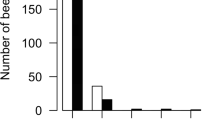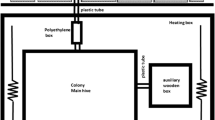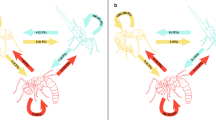Abstract
A primary determinant of colony organization in temporally polyethic insect societies is inter-individual variation in behavior that is independent of worker age. We examined behavioral repertoires, behavioral correlates of adult development, and spatial distributions within the hive to explore the mechanisms that produce behavioral variation among middle-age honey bees (Apis mellifera). Individually labeled undertakers, guards, food storers, and wax workers exhibited a broad range of task-related behavior, but bees tagged as undertakers were more likely to subsequently remove a corpse from the hive and handle a corpse compared to other middle-aged bees. The activity level of undertakers was similar to other task groups, suggesting that undertaking specialists were neither hyper-active “elites” nor quiescent “reserves” that become active only when a dead bee stimulus is present. Undertakers also were more likely to remove debris and to remain in the lower region of the hive or near the entrance, even when not engaged in corpse removal; both preferences may promote colony efficiency by reducing inter-task travel times. Guards and undertakers were less likely to perform behavior normally associated with young bees compared to food storers and wax workers. Undertakers and guards also initiated foraging at earlier ages than the other task groups. These results suggest that undertakers and guards may be slightly developmentally advanced compared to food storers and wax workers. There also was evidence for lifetime differences in behavioral preferences which could not be explained by differences in adult development. Bees tagged as undertakers were more likely to subsequently remove a dead bee during their entire pre-foraging career compared to other task groups or members of their general age cohort. Differences in both the rate of adult development and individual behavioral preferences, both of which may be subject to genetic and environmental influences, are important determinants of inter-individual variation among honey bees of middle age.
Similar content being viewed by others
Author information
Authors and Affiliations
Additional information
Received: 5 February 1997 / Accepted after revision: 27 May 1997
Rights and permissions
About this article
Cite this article
Trumbo, S., Huang, ZY. & Robinson, G. Division of labor between undertaker specialists and other middle-aged workers in honey bee colonies. Behav Ecol Sociobiol 41, 151–163 (1997). https://doi.org/10.1007/s002650050374
Issue Date:
DOI: https://doi.org/10.1007/s002650050374




